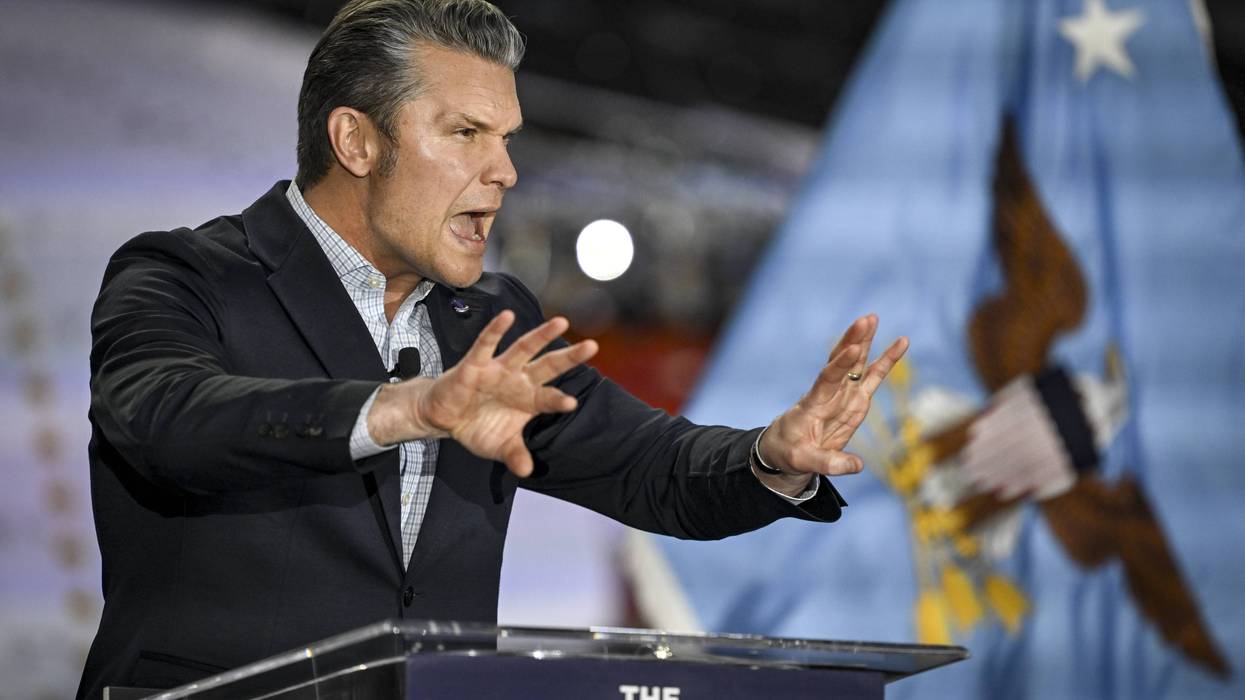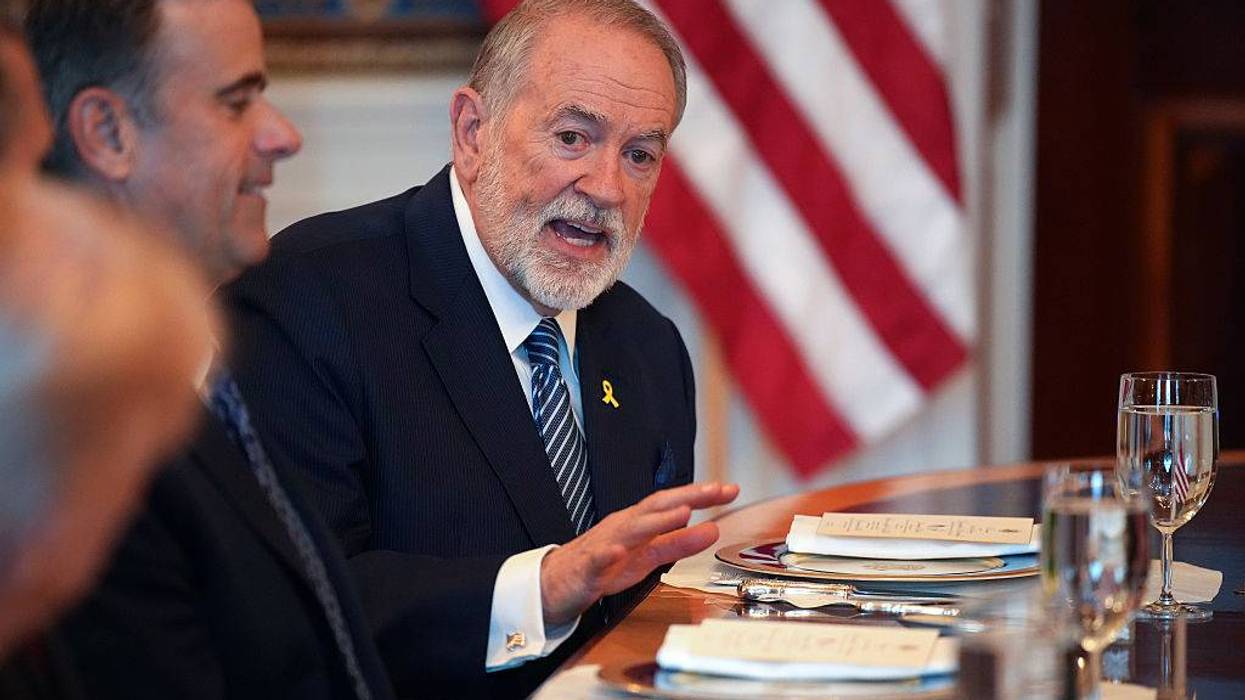January, 07 2014, 10:26am EDT

For Immediate Release
Contact:
Adam Crowther (202) 454-5112
Karilyn Gower (202) 588-7779
Even a Partial Elimination of Contribution Limits in U.S. Supreme Court's McCutcheon's Decision Could Greatly Increase Wealthy Donors' Ability to Corrupt Officeholders
Public Citizen Report: Decision Could Allow Individuals to Funnel Millions of Dollars to Fundraising Committees
WASHINGTON
Even if the U.S. Supreme Court only partially strikes down caps on aggregate campaign contributions when it rules in McCutcheon v. Federal Election Commission, the decision could still open the door to candidates and party officials soliciting individual donors for checks of more than $2.5 million and would increase the likelihood of corruption, Public Citizen concludes in the first of a two-part series on the possible implications of the case.
The report, "Beware of a Naive Perspective: A Prebuttal to Possible U.S. Supreme Court Rulings in McCutcheon v. Federal Election Commission," finds that a partial or complete elimination of aggregate contribution limits would enable joint fundraising committees to take on a vastly expanded role because they would be able to receive significantly larger contributions than at present.
"The way political candidates and parties raise money could be fundamentally reshaped by the U.S. Supreme Court's decision in McCutcheon," said Adam Crowther, researcher with Public Citizen's Congress Watch division and co-author of the report. "It would be naive to believe that those party leaders or candidates that benefit from money funneled through joint fundraising committees would not be more likely to provide special favors to those donors."
In McCutcheon, GOP donor Shawn McCutcheon and the Republican National Committee are challenging limits on the cumulative total of contributions a person may make to candidates, political parties and political action committees (PACs). The case does not challenge limits on contributions to individual entities, such as the cap of $2,600 a person may give to each candidate per election.
Under current law, individuals can donate as much as $123,200 per election cycle to regulated federal political committees, with a $48,600 cap on total contributions to candidates and a $74,600 cap on total contributions to PACs and political parties. The challengers in McCutcheon attack the constitutionality of each of these three aggregate limits.
The court could rule in several ways:
1) It could maintain the existing limits on aggregate contributions;
2) It could eliminate all aggregate limits, thereby abolishing the $123,200 biennial limit, as well as the separate sub-limits for candidates and political and party committees; or
3) The court could preserve some aggregate limits but eliminate others.
Based on Chief Justice John Roberts' comments during oral arguments, some have speculated the court might settle on a hybrid approach of eliminating aggregate contribution limits on candidates but maintaining limits for parties and PACs. But even partially repealing the caps could allow a small group of donors to unduly influence elected officials and party leaders, Public Citizen's report concludes.
The analysis finds that if the court were to put in place this hybrid option, donors could still write a single check of more than $2.5 million to a joint fundraising committee. A complete elimination of aggregate limits would permit a single donor to write a $5.9 million check to a fundraising committee controlled by an elected official or party leader.
"It is not engaging in 'wild speculation,' as some on the court have suggested, to recognize how the campaign system might be abused in the event of a court decision striking down aggregate contribution limits, in whole or part. It's a matter of facing reality," said Public Citizen President Robert Weissman. "In Citizens United, the court's theory that outside spending groups would be 'independent' of the candidates was almost immediately disproven when it was tested in the real world. We hope the court does not succumb to such narrow thinking again."
Part 2 of the series, to be published next week, will illustrate that striking down the caps on contributions to candidates could erode the integrity of caps on donations to parties even if the court officially left the party limits in place.
See full report.
Public Citizen is a nonprofit consumer advocacy organization that champions the public interest in the halls of power. We defend democracy, resist corporate power and work to ensure that government works for the people - not for big corporations. Founded in 1971, we now have 500,000 members and supporters throughout the country.
(202) 588-1000LATEST NEWS
US Commanders Want to Make War With Iran as ‘Bloody’ as Possible to Bring About Biblical End Times, Officers Report
One noncommissioned officer said he was directed to tell his troops that Trump was "anointed by Jesus" and that war with Iran was "all part of God’s divine plan" to bring about Armageddon.
Mar 03, 2026
In less than a week, the US and Israel's war has rendered unfathomable suffering upon the people of Iran. Over 180 schoolgirls and staffers were killed in a massacre this weekend, and several hospitals have reportedly been struck, amid numerous other attacks on civilians.
But some US troops are being told the bloodletting is all a part of God's plan.
At a briefing on Monday, as President Donald Trump unleashed what has been called a "carpet bombing" of Tehran, a combat-unit commander reportedly told noncommissioned officers (NCOs) that the commander-in-chief was “anointed by Jesus to light the signal fire in Iran to cause Armageddon and mark his return to Earth."
The complaint, sent by one of those noncommissioned officers, was just one of at least 110 similar reports received by the Military Religious Freedom Foundation (MRFF) since Trump first launched strikes on Saturday.
In compliance with the First Amendment, the Department of Defense has long adopted rules against proselytizing within the armed forces. But under Defense Secretary Pete Hegseth, an evangelical Christian who has said the West must wage a "crusade" against Islam, Christian nationalist invocations in the military have become commonplace.
Mikey Weinstein, the president and founder of MRFF and an Air Force veteran who served in the White House of former President Ronald Reagan, told independent journalist Jonathan Larsen that the group has been “inundated” with complaints from NCOs since Saturday, which all have “one damn thing in freaking common.”
"Our MRFF clients report the unrestricted euphoria of their commanders and command chains as to how this new 'biblically-sanctioned' war is clearly the undeniable sign of the expeditious approach of the fundamentalist Christian 'End Times' as vividly described in the New Testament Book of Revelation," Weinstein said.
"Many of their commanders," he added, "are especially delighted with how graphic this battle will be, zeroing in on how bloody all of this must become in order to fulfill and be in 100% accordance with fundamentalist Christian end-of-the-world eschatology."
According to Larsen, who first reported on the MRFF's findings on Monday, the message has been spread far and wide as US troops rained missiles down upon Iran.
Larsen reported that the "complaints came from more than 40 different units spread across at least 30 military installations," and have involved commanders in every branch of the US military.
One noncommissioned officer, who did not identify himself out of fear of retaliation, said his commander “urged us to tell our troops that this was ‘all part of God’s divine plan’ and he specifically referenced numerous citations out of the Book of Revelation referring to Armageddon and the imminent return of Jesus Christ.”
The NCO added that his commander "had a big grin on his face when he said all of this, which made his message seem even more crazy."
"Our commander would probably be described as a 'Christian First' supporter," he said. "He has been this way for a very long time and makes it clear that he desires all of us under him to become just like him as a Christian. But what he did this morning was so toxic and over the line that it shocked many of us in attendance at the ops readiness briefing."
The NCO identified himself as a Christian, but emailed MRFF on behalf of 15 of his troops, which included at least one Muslim and one Jewish person.
He said that their commanders' remarks “destroy morale and unit cohesion and are in violation of the oaths we swore to support the Constitution.”
Christian nationalism has long simmered just under the surface of US military culture and has been invoked by presidents of the past, including George W. Bush, who referred to his War on Terror as a "crusade."
But Hegseth, who regularly hosts Christian prayer services at the Pentagon during work hours, rails against "secular humanism" and the "godless left," and has hosted the notorious fundamentalist pastor Doug Wilson—who opposes the right of women to vote and calls for the US to be a Christian theocracy—at the Pentagon, has dropped any pretenses of religious pluralism.
"While America’s relationship with Iran is influenced by all the typical geopolitical factors of oil, culture, and nuclear weaponry, there is a part of American foreign policy that is influenced by apocalyptic evangelical theology," wrote Josh Olds, a pastor and theologian, on Monday for Baptist News Global.
Christian fundamentalists, some of whom have the ear of the White House, he said, view an Iranian war with Israel as central to triggering Armageddon, during which God will miraculously strike down Israel's enemies, Jesus will return to Earth, and Christians will be raptured to Heaven, according to Biblical teachings.
He said that while Iran's Muslim leaders are often accused of being dangerously irrational out of blind religious fundamentalism, "it is increasingly clear that American actions are shaped by it as well."
In just over three days, US and Israeli strikes have killed at least 787 people in Iran, according to a Tuesday report from the Iranian Red Crescent Society, including hundreds of civilians. In addition to schools and hospitals, attacks have been reported against crowded residential buildings, a radio and TV broadcast center, and a sports complex.
"Donald Trump partnered with Israel to bomb Iran because of the influence of an eschatology that sees conflict with Iran as setting the stage for fulfilled prophecy," Olds said. "The irony is profound: A faith centered on loving enemies and making peace becomes a framework that welcomes and advocates violence. The result is not the advance of God’s kingdom but its irrevocable damage in the eyes of the world."
Keep ReadingShow Less
‘Incompetence Everywhere’: Fury as US Embassy Says Americans Stuck in Israel Are On Their Own
"The strike itself is illegal and disastrous but their lack of readiness for what comes next is unforgivable as well," said Sen. Chris Murphy.
Mar 03, 2026
The US Embassy in Jerusalem sparked outrage on Tuesday when it said it was unable to help Americans stuck in Israel leave the country amid an escalating regional conflict with Iran.
In a message posted on social media, the embassy said it "is not in a position at this time to evacuate or directly assist Americans in departing Israel," and recommended seeking help from Israeli tourism officials.
"The Israeli Ministry of Tourism has begun operating shuttles to the Taba Border Crossing as of March 2," the embassy stated. "To be added to the passenger list for a shuttle, you must register via the Ministry’s evacuation form. The US Embassy cannot make any recommendation (for or against) the Ministry of Tourism's shuttle. If you choose to avail yourself of this option to depart, the US government cannot guarantee your safety."
The embassy's message came three days after the US and Israel launched an unprovoked attack on Iran, which has retaliated by launching drone strikes on US allies throughout the Middle East.
Many critics slammed the US embassy for being so unprepared to help its own citizens despite having advance knowledge that a large-scale attack on Iran was a real possibility.
"Mike Huckabee’s embassy is always ready to defend Israel," wrote Zeteo News editor-in-chief Mehdi Hasan, "but not to help American citizens, it seems."
US Sen. Chris Murphy (D-Conn.) said that the Jerusalem embassy's helplessness in the face of an emergency was evidence of "incompetence everywhere."
"So the State Department is forcing everyone to immediately leave the region but is also refusing to help people leave the region," he wrote. "The strike itself is illegal and disastrous but their lack of readiness for what comes next is unforgivable as well."
Murphy's criticism was echoed by former US Rep. Marjorie Taylor Greene (R-Ga.), a one-time ally of President Donald Trump who in recent months has become a staunch critic of the president's decisions.
"American tax payers are forced to give Israel $3.8 BILLION every single year," she wrote, "and here is our own US Embassy in Jerusalem telling Americans good luck getting out, you are on your own. The betrayal is unbelievable."
Tommy Vietor, former National Security Council staffer under President Barack Obama, expressed outrage at the Trump White House for leaving Americans out to dry.
"All those years demagoguing Benghazi and pretending to give a shit about Americans overseas," wrote Vietor, "and now the White House starts a reckless war with Iran and tells everyone trying to escape the chaos that you're on your own."
Sam Stein, a reporter at The Bulwark, observed that the US Department of State only put out an alert encouraging Americans to leave Israel and 13 other countries in the region on Monday, two days after the strikes against Iran began.
"This morning, the Embassy in Jerusalem says it can't help with that," Stein marveled.
Anti-gun violence activist Fred Guttenberg unleashed an angry tirade at the Trump administration upon seeing the US embassy's message.
"THEY HAD NO FUCKING PLAN!!!" he wrote. "Americans are at risk now because they had no FUCKING plan."
Keep ReadingShow Less
Hegseth Calling Rules of Engagement ‘Stupid,’ Critics Warn, Opens Door to War Crimes in Iran
"We are a rogue murder state now, and positively proud of it," said one historian.
Mar 03, 2026
US Pentagon Secretary Pete Hegseth's dismissal on Monday of what he called "stupid rules of engagement" in the illegal war against Iran amounted to an invitation for American and allied forces to commit war crimes, human rights organizations and other critics warned.
Hegseth's remarks came during a press conference alongside the top US general, Joint Chiefs of Staff Chairman Dan Caine. The Pentagon chief boasted that the US is "unleashing the most lethal and precise air power campaign in history," "all on our terms with maximum authorities," unbound by "stupid rules of engagement," and undeterred by "what so-called international institutions say"—an apparent reference to the United Nations.
Hegseth, an accused war criminal who successfully lobbied President Donald Trump to pardon alleged or convicted war criminals during his first White House term, also praised Israel for its willingness to dispense with rules of engagement, "unlike so many of our traditional allies who wring their hands and clutch their pearls, hemming and hawing about the use of force."
Human Rights Watch (HRW) said in a statement Monday that "these remarks are concerning in light of Hegseth’s actions in the past year that have weakened US military posts and mechanisms intended to ensure compliance with international humanitarian law, also known as the laws of war."
"Rules of engagement are official military directives that tell military forces when, where, how, and against whom force may be used. They must always be in accordance with the laws of war," said HRW. "Hegseth abolished 'civilian environment teams' and other mechanisms intended to limit harm to civilians during operations. The 2026 National Defense Strategy omitted references to civilian protection and the Defense Department rolled back restrictions on its use of antipersonnel landmines and moved ahead with cluster munitions procurement despite these weapons' foreseeable immediate and long-term harm to civilians."
"Human Rights Watch will endeavor to assess whether these Defense Department actions unlawfully increase the risk of harm to civilians during US military operations," the group added. "US civilian and military officials should reaffirm US compliance with the laws of war and restore the personnel and oversight structures that help protect civilians during armed conflict."
Historian Seth Cotlar wrote on social media that Hegseth's comments underscored that "we are a rogue murder state now, and positively proud of it."
The Pentagon chief's remarks came days after a girls' school in Iran was bombed, allegedly by US or Israeli forces. The US Central Command said it was "looking into" the attack, which killed 165 people—most of them girls between the ages of 7 and 12. The Guardian notes that the school was "adjacent to a cluster of buildings that form the local Islamic Revolutionary Guard Corps (IRGC) barracks and support buildings."
An Al Jazeera investigation concluded the school strike was likely "deliberate."
When Hegseth says "no stupid rules of engagement," this is what he means.
[image or embed]
— Scott Horton (@robertscotthorton.bsky.social) Mar 2, 2026 at 11:40 PM
The Euro-Mediterranean Human Rights Monitor said in a statement over the weekend that "any deliberate attack on a school or on civilians, as well as any indiscriminate or disproportionate attack that violates the principles of distinction and proportionality, constitutes a grave breach and may amount to a war crime where intent to target the school is established or where the attack is indiscriminate or disproportionate."
Hegseth has previously derided limitations on US troops' conduct overseas as "stupid." During remarks to hundreds of generals last year, the Pentagon chief declared that we "untie the hands of our warfighters to intimidate, demoralize, hunt, and kill the enemies of our country."
"We unleash overwhelming and punishing violence on the enemy," Hegseth said at the time. "No more politically correct and overbearing rules of engagement."
Keep ReadingShow Less
Most Popular


